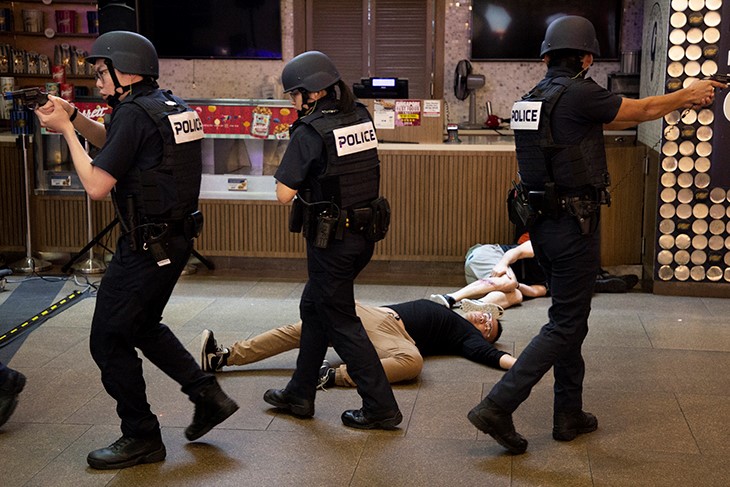February 2018: It was a
routine enforcement operation. The suspect – a 33-year-old woman – was arrested at Kinta Road in Little India, and in her bag, officers of the
Central Narcotics Bureau (CNB) found 27g of “Ice” (Methamphetamine) and 195g of heroin.
Checking the suspect’s handphone, investigators made a harrowing discovery – messages that referred to a toddler she was taking care of. After repeated denials, the suspect finally admitted that she was minding an abandoned child who was believed to be with drug traffickers.
The investigators sprang into action, mounting a second operation to locate the child. The next day, a 51-year-old male suspect was arrested at a hotel room in Joo Chiat. With him was a one-year-old boy; he was taken in by CNB officers and handed over to the
Child Protective Service (CPS).
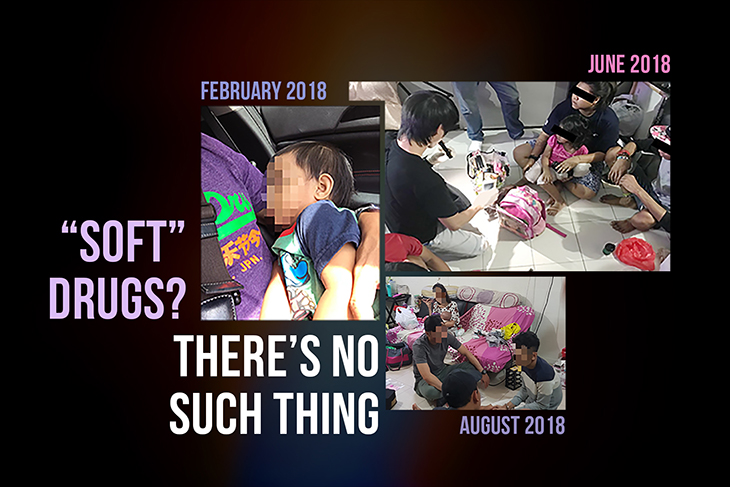
Innocent victims: In three CNB enforcement operations this year, young children were rescued from drug addicts and traffickers. PHOTOS: CNB
June 2018: As part of a
five-day, islandwide enforcement operation, CNB officers raided a unit near Chin Swee Road. Inside, they found sachets of “Ice,” drug-smoking apparatus and a four-year-old girl. The daughter of one of six suspects arrested at the raid, she was placed in the care of the CPS.
August 2018:
Raiding a unit at Telok Blangah Crescent, CNB officers arrested two suspected drug offenders. A three-month-old girl – the daughter of a 24-year-old suspected abuser – was also found.
These three cases illustrate the victims of drug abuse are not limited to abusers themselves and how it can harm even the most innocent among us. When children become the collateral damage of drugs and crime, enforcement becomes even more urgent and necessary.
Central to these cases is the presence of “Ice”. Wrongly regarded – like cannabis – as being less harmful or less addictive by young abusers, “Ice” is increasingly a drug of concern in Singapore. Here are three things that young people are getting wrong about “Ice” and cannabis.
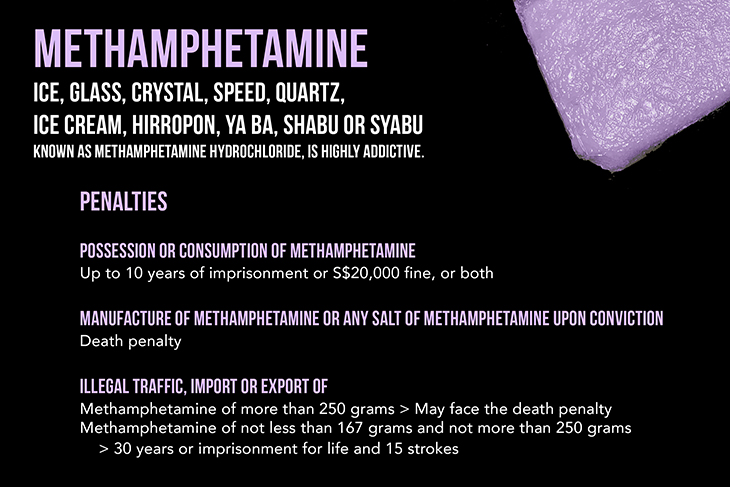 Reality Check #1: There’s No Such Thing as “Soft” Drugs
Reality Check #1: There’s No Such Thing as “Soft” Drugs
“What’s the harm in trying ‘Ice’ or cannabis? They’re safe.”
Many young addicts regard “Ice” and cannabis as “lifestyle” drugs that are “less harmful” or addictive than substances like heroin and cocaine. This arises from a wrongful understanding of the nature of drug addiction.
Researchers, medical professionals and counsellors understand that drug addiction can take over an abuser’s life quickly, to devastating effect. So the notion that certain drugs are less harmful or addictive is misguided – as many young abusers will attest, “Ice” and cannabis can cause compulsive dependence as well as great physical and psychological harm.
Reality Check #2: You’re Not in Control
“No problem, I can quit any time.”
According to the CNB, many young addicts in Singapore get their first exposure to drugs from their friends. They try “Ice” and cannabis because they believe they can stop any time.
But willpower has nothing to do with the reality of addiction. Drug abuse causes changes to the brain and body that, over time, destroy an abuser’s self-control and ability to resist drugs. Impaired judgment and a profound loss of self-control are hallmarks of drug addiction, leading many young abusers on a downward spiral of despair and crime.
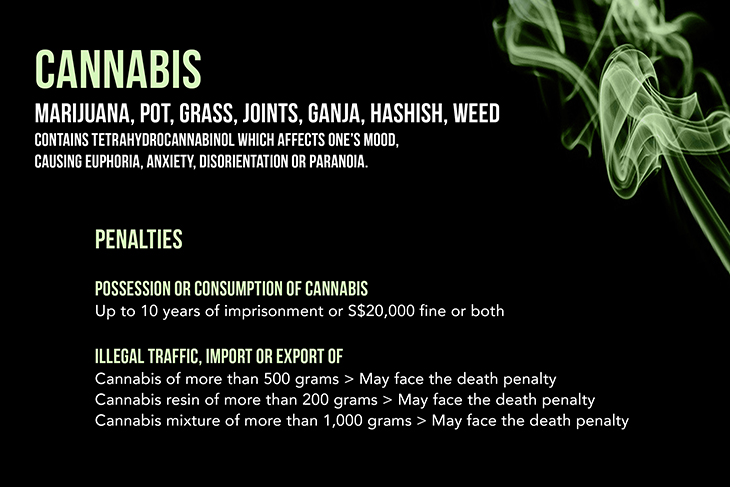 Reality Check #3: Are You Sure the Grass is Greener Over There?
Reality Check #3: Are You Sure the Grass is Greener Over There?
“Singapore is behind the times; look at what people in other countries are doing.”
Singapore’s anti-drug policy encompasses preventive drug education, strong laws and effective enforcement as well as rehabilitation and community reintegration. This multi-pronged approach is unique to our history and societal context, and over five decades, has helped curb drug abuse and crime in Singapore.
The safety and security that we enjoy today isn’t a given, and veteran CNB officers still recall the difficult enforcement efforts that have been waged against opium, cannabis, heroin and now synthetic drugs such as “Ice”.
Thankfully, for us, drug addiction isn’t the deeply rooted and intractable problem that it is in many other cities and countries. But Singapore isn’t immune to the global drug situation. When it comes to our youth, for example, attitudes towards drugs have changed over the years. A 2015/2016 survey by the
National Council Against Drug Abuse found that while most youths supported Singapore’s zero-tolerance approach, many were increasingly permissive when it came to drugs (increasing from 11% in 2013 to 16% in 2016).
Tellingly, the survey also found that 58% of youths learnt about drug-related content via social media, which tends to normalise drug use rather than allow for a balanced consideration of its risks. When it comes to cannabis, for instance, it’s little remarked upon that there’s
inconclusive data on whether it is effective in treating most medical conditions, with any supposed benefits based on anecdotal cases. A study by the US National Institutes of Health also looked at how cannabis affected people’s behaviour and found that, in fact,
it substantially raised the risk of opioid abuse.
The best way to navigate these challenges is to learn more for yourself.
This webpage is a good place to start for youths, while
this toolkit is specially designed for educators and youth counsellors. The bottom line is that we need to get wiser about the very real dangers of “Ice,” cannabis and other drugs.
Appreciating Our Anti-Drug Volunteers
At the Yellow Ribbon Community Project (YRCP) Annual Appreciation Luncheon on 15 September 2018, Mr K Shanmugam, Minister for Home Affairs and Minister for Law, spoke about Singapore’s commitment to fighting drugs. Read his speech
here.
To learn more about our YRCP volunteers check out
Accepting the Families of Ex-offenders as Our Own.






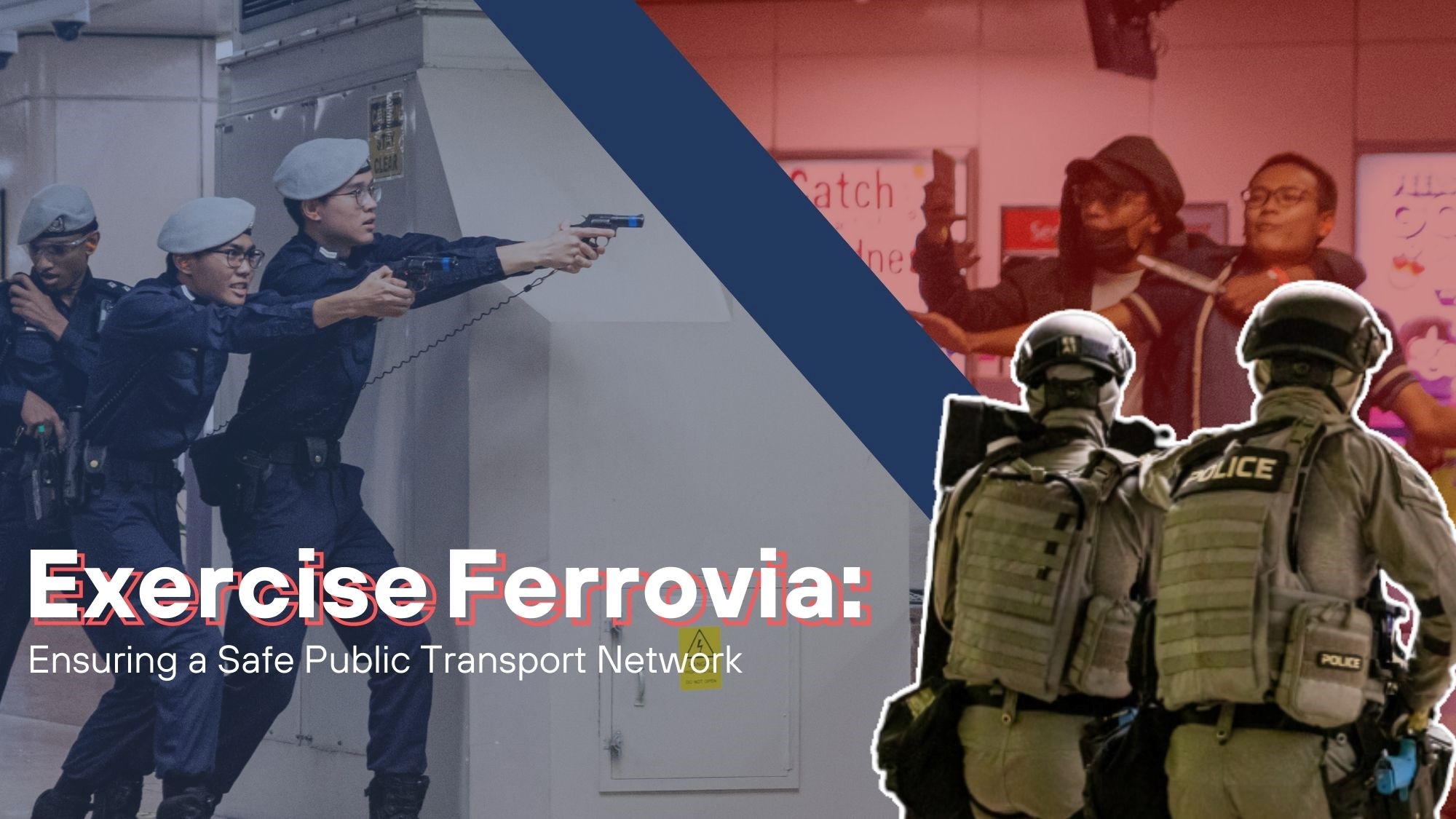
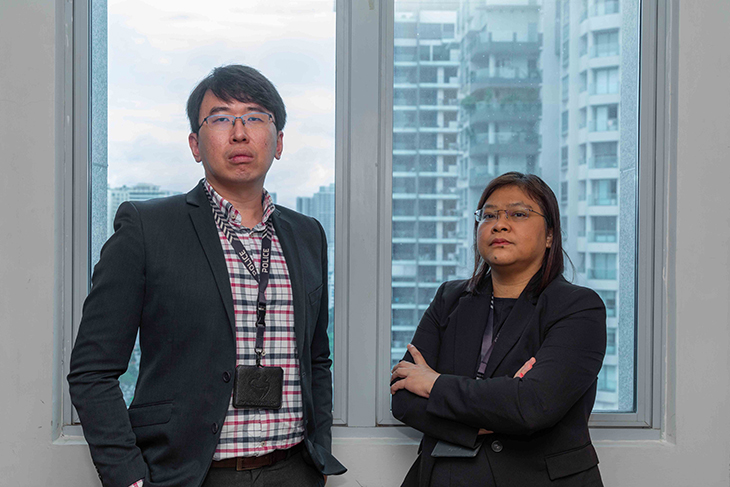
.jpg?sfvrsn=e1ae8cf0_0)
